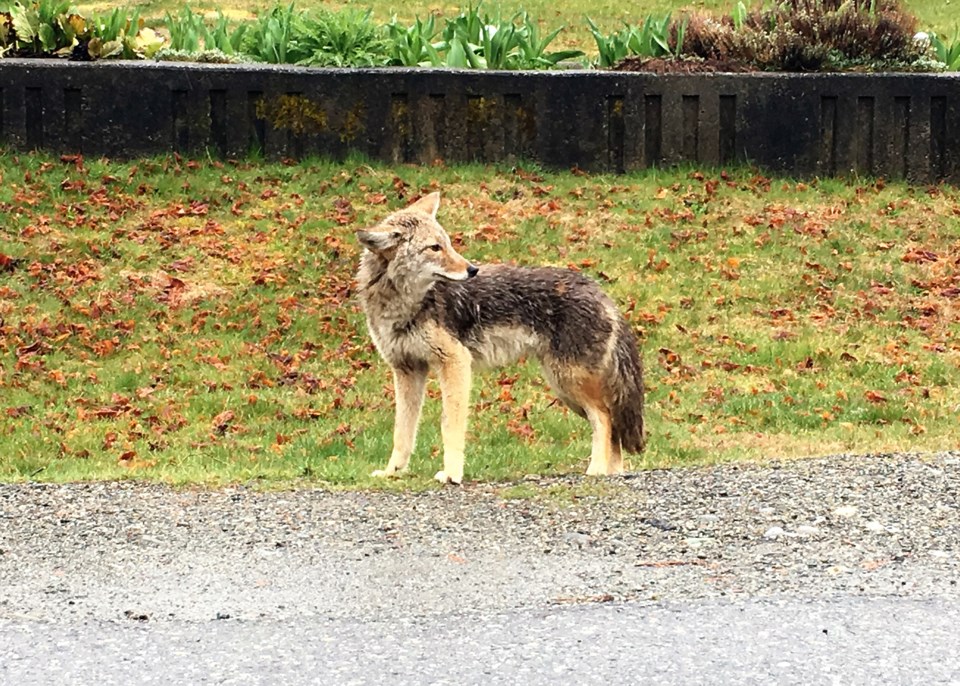Squamish's Monique Hurteau has had plenty of encounters with coyotes over the years, but nothing like this, she says.
“This time was one thousand per cent different,” she said.
Hurteau and her dog Jake — a 90-pound husky and border collie mix
— were walking on the evening of April 29 along Skyline Drive, north of Garibaldi Village Mall, when she spotted a coyote cross the road.
“We see them quite regularly, either in the shadows or across the street,” said Hurteau.
When she was about 30 feet from the Skyline Drive crossing, the coyote stopped and was staring at her and Jake and then started to approach them.
“It started to cut the angle, circle,” she said.
It was the biggest coyote she had seen, around 50 pounds, Hurteau estimates.
Hurteau had read about coyote safety so she started to yell and wave her arms. Jake, on a leash, was barking incessantly.
The coyote crossed the road and was then about 40 feet away, but then stopped and watched the pair again.
Hurteau continued to yell and Jake continued to bark, Hurteau recalled.
Then the coyote came back at them again — this time coming even closer.
“It was probably within seven to 10 feet away,” she said, and then the coyote scooted further away but stopped and continued to watch Hurteau and Jake.
“Throughout this whole time, I am scoping the perimeter and wondering where the other ones are,” she said.
Hurteau backtracked and was eventually able to make it home.
The coyote encounter took just a few minutes, but was scary, Hurteau said.
She has continued to walk with Jake in the same area and has seen at least three other coyotes since, but the encounters have been uneventful.
Hurteau carries a flashlight and has a horn to blow if she has another run-in with a coyote acting aggressively.
She wanted to go public with her encounter to warn people who may not be coyote-aware and also to remind fellow residents that leaving out attractants can cause coyotes and other wildlife to become habituated to humans.
Letting cats out or leaving birdseed in the yard, “brings the whole food chain to all of us,” Hurteau said. “They lose their fear.”
Meg Toom of WildSafeBC says that from the sounds of it, the coyote Huteau and Jake encountered was "definitely following and was interested in them."
“Smaller dogs can be seen as prey, larger dogs as competition for territory and food resources,” she said.
Hurteau did everything right, according to Toom.
“I did suggest she carry bear spray as it can be used with persistent coyotes, cougars, bears,” Toom said.
In the event of an aggressive coyote, Toom says people should, “make yourself appear large, maintain eye contact, speak in a low firm voice or shout, wave your arms and if you have a walking stick or gardening implements such as a rake or shovel use it as a weapon against the coyote,” she told The Chief.
“Throwing rocks or sticks and making noise with pots and pans, or tin cans can also work. If the coyote continues to approach, do not run or turn your back on it, continue looking large and making noise while you slowly retreat. Move towards more people or into your home or vehicle.”
Other considerations Toom noted for dog owners:
* Keep dogs on a leash and under control and avoid using extension leashes, especially with small dogs, when out in areas where coyotes are known to be. Coyotes will view small dogs as prey.
* Remember coyotes may be more aggressive towards dogs during January and February when they are looking for mates.
* Do not allow your dog - even larger dogs - to interact with coyotes. Doing so permits coyotes to become familiar with humans and pets and this increases the risk of negative human-coyote interactions.
Toom added that there had been word of mouth reports that coyotes have been active in Valleycliffe as well, but those sightings haven't been called into the BC Conservation Officer Service.
“This information can then trigger proactive education and awareness campaigns,” she said. “If there are no reports then it's difficult to be proactive.”
Call the Conservation Officer Service at 1-877-952-7277 to report any coyotes that display aggression or lack fear of people or pets.




